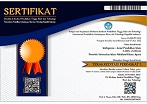PENGEMBANGAN KURIKULUM PAI BERBASIS KOMPETENSI ABAD 21
Abstract
This study aims to respond to the dynamic and fast-paced educational needs of the digital era in the 21st century by developing a curriculum for Islamic Religious Education (IRE) that integrates essential competencies such as critical thinking, creativity, collaboration, and communication. The methodology employed is an in-depth literature review, combining various prior research sources to formulate a holistic approach to curriculum development that is both applicable and relevant. Key findings from this study indicate that integrating technology into IRE significantly enhances student interest and motivation, while also facilitating the development of critical 21st-century skills. Additionally, the study reveals that innovative curriculum implementation requires effective collaboration between educators, educational institutions, and policymakers. This research also emphasizes the importance of adapting the curriculum to local values and the Indonesian culture to ensure relevance and acceptance in a broader social context. Recommendations include the need for intensive training for educators, robust infrastructure support, and an ongoing process of evaluation and revision of the curriculum to maintain its relevance and effectiveness.
Keywords
Full Text:
PDFReferences
Ali Ibrahim, M. T., Safitri, I., Agustina, N. M., Elyana, L., Saksono, H., Si, M., Widodo, T. W., Khoiri, A., & Abroto, S. P. (2024). Metodologi Penelitian Pendidikan. Cendikia Mulia Mandiri.
Cahyono, E. A., Sutomo, N., & Hartono, A. (2019). Literatur review; panduan penulisan dan penyusunan. Jurnal Keperawatan, 12(2), 12.
Esther Care, & Patrick Griffin. (2018). Assessment and Teaching of 21st Century Skills (mark Wilson, Ed.). Springer.
Fadli, M. R. (2021). Memahami desain metode penelitian kualitatif. Humanika, Kajian Ilmiah Mata Kuliah Umum, 21(1), 33–54.
Fauzan, M. A., & Arifin, F. (2022). Desain Kurikulum dan Pembelajaran Abad 21. Prenada Media.
Jamin, H. (2018). Upaya meningkatkan kompetensi profesional guru. At-Ta’dib: Jurnal Ilmiah Prodi Pendidikan Agama Islam, 19–36.
Jelahut, F. E. (2022). Aneka teori dan jenis penelitian kualitatif.
Kadarwati, A., & Malawi, I. (2017). Pembelajaran tematik:(Konsep dan aplikasi). Cv. Ae Media Grafika.
Kurniati, P., Kelmaskouw, A. L., Deing, A., Bonin, B., & Haryanto, B. A. (2022). Model proses inovasi kurikulum merdeka implikasinya bagi siswa dan guru abad 21. Jurnal Citizenship Virtues, 2(2), 408–423.
Maimunah, M. (2024). Inovasi Evaluasi Pembelajaran dalam Kurikulum PAI. AL-MIKRAJ Jurnal Studi Islam Dan Humaniora (E-ISSN 2745-4584), 4(02), 1374–1387.
Mukmin, M., Subakti, H., Sulaiman, S., Zainuri, H., Saputro, A. N. C., Sihaloho, M., Awal, R., Labuem, S., Yusuf, B., & Kholifah, N. (2024). Inovasi Pembelajaran di Abad 21. Yayasan Kita Menulis.
Mustari, M., Zainuri, H., Krisnaresanti, A., Amir, J., Eprillison, V., Aritonang, M. A. S., Wahidin, L. O., Nasori, A., Safii, M., & Erita, E. (2024). Pengantar Teknologi Pendidikan. Yayasan Tri Edukasi Ilmiah. https://books.google.co.id/books?id=J_EIEQAAQBAJ
Nurhayati, E. S., & Wijayanti, L. (2023). Tinjauan literatur sistematis terhadap eksistensi dan kompetensi profesi pustakawan menyongsong era society 5.0. BACA: Jurnal Dokumentasi Dan Informasi, 44(2), 77–96.
Nurhayati, S. (2011). Pendekatan Kontekstual dalam Pengembangan Kurikulum PAI. Journal of Islamic Education, 11(1), 45-59., 11(1), 45–59.
Pitoy, A. D., Wowor, V. N. S., & Leman, M. A. (2021). Efektivitas dental health education menggunakan media audio visual dalam meningkatkan pengetahuan siswa sekolah dasar. E-GiGi, 9(2), 243–249.
Sarie, F., Sutaguna, I. N. T., Par, S. S. T., Par, M., Suiraoka, I. P., St, S., Darwin Damanik, S. E., Se, M., Efrina, G., & Sari, R. (2023). Metodelogi penelitian. Cendikia Mulia Mandiri.
Supriadi. (2019). Integrasi Teknologi dalam Pembelajaran PAI. Jurnal Pendidikan Islam, 14(2), 123–137.
Trilling, B., & Fadel, C. (2009). 21st Century Skills: Learning for Life in Our Times. Jossey-Bass.
Utomo, S. T., & Ifadah, L. (2020). Inovasi kurikulum dalam dimensi tahapan pengembangan kurikulum pendidikan agama Islam. Journal of Research and Thought on Islamic Education (JRTIE), 3(1), 19–38.
Yusuf, M. (2023a). Inovasi Pendidikan Abad-21: Perspektif, Tantangan, dan Praktik Terkini. Selat Media.
Yusuf, M. (2023b). Inovasi Pendidikan Abad-21: Perspektif, Tantangan, dan Praktik Terkini. Selat Media.
Zainuri, H., Mandagi, D. W., Rela, I. Z., Nurtanto, M., Rusman, M. A. A., Syafrizal, S., Sahir, S. H., Simarmata, J., & Aini, A. (2024). Desain Penelitian Kualitatif. Yayasan Kita Menulis.
Zainuri, H., Subakti, H., Tawakkal, M. I., Umurohmi, U., Saputro, A. N. C., Mukmin, M., Simarmata, J., Pratiwi, I. I., & Iwan, I. (2024). Revolusi Kurikulum: Membangun Pondasi Pendidikan Abad ke-21. Yayasan Kita Menulis.
Zakariyah, Z., Arif, M., & Faidah, N. (2022). Analisis Model Kurikulum Pendidikan Agama Islam Di Abad 21. AT-TA’DIB: JURNAL ILMIAH PRODI PENDIDIKAN AGAMA ISLAM, 1–13.
DOI: https://doi.org/10.34001/intelegensia.v12i1.6848
Article Metrics
Refbacks
- There are currently no refbacks.
Copyright (c) 2024 Intelegensia : Jurnal Pendidikan Islam

This work is licensed under a Creative Commons Attribution-ShareAlike 4.0 International License.
Currently this Journal is Indexed by

This work is licensed under a Creative Commons Attribution-ShareAlike 4.0 International License.











